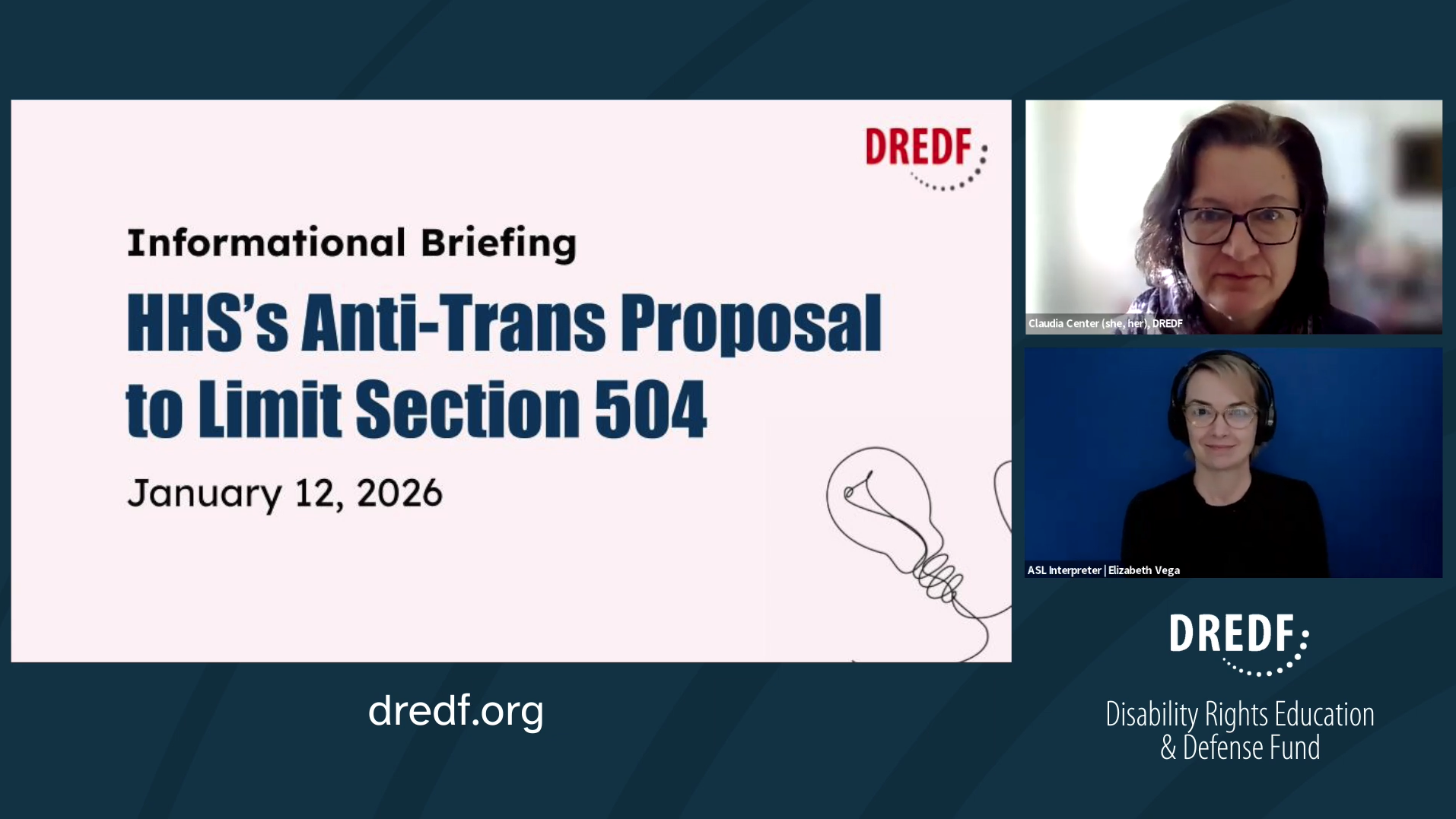
For Immediate Release:
June 25, 2025
WASHINGTON, DC – The Disability Rights Education and Defense Fund (DREDF) urges all members of the Senate to reject the proposed budget language. The Senate’s version of the budget bill results in even deeper cuts to Medicaid and Medicare than the House version of the bill, with over $1 trillion in healthcare cuts. The budget bill is cruel. It jeopardizes our nation’s well-being, targets already at risk immigrant and transgender communities, and leads to dangerous, life-threatening Medicaid and Medicare cuts that would deeply harm disabled people and older adults. DREDF calls on all members of Congress to defend the health and rights of our communities, and commit to ensuring Medicaid and Medicare continue to provide reliable healthcare, including community-based supports and services for all people in need.
The proposed bill would lead to at least 16 million people losing healthcare coverage.[1] People without healthcare coverage delay seeing the doctor or can’t afford treatment, they get sicker and miss work or risk being fired, or they go to work and potentially expose others to a virus. As a result of these healthcare coverage losses, an estimated 51,000 people will die every year.[2] When states have faced Medicaid budget cuts in the past, every state reduced its coverage of homecare services that people with disabilities need to stay out of costly institutions because federal law requires Medicaid to cover institutional care but not homecare.[3] The proposed budget targets already vulnerable low-income people, people with disabilities, students, immigrants, transgender people, and Black, Brown and Tribal communities.
Harmful parts of the bill affect disabled people, our neighbors, and our families by:
- Forcing states to adopt job loss penalties, including for parents with children older than 14 and adults up to 64 years, repealing simplified eligibility rules, and increasing the frequency of eligibility redeterminations to every 6 months, making it harder for people to stay enrolled.[4] At the same time, the bill is expected to reduce over a million jobs nationwide.[5] People with disabilities already face employment discrimination that means they are the last to be hired and the first to be fired, and barriers to employment such as limited transportation. Beginning in 2027, low-income people with disabilities who work less than 20 hours a week will not be permitted to enroll in Medicaid.
- Creating so-called exemptions that are difficult for people with disabilities to meet and apply for. Many people with disabilities that do not fit into Congress’s restrictive definition of disability could lose their care, including those who are not enrolled in very strict government programs under the Social Security Administration. People who don’t have a clearly defined diagnosis, who have disabilities that can worsen and improve over time, such as some mental health disabilities, or who experience periods of seasonal unemployment will all have trouble proving their eligibility for Medicaid.
- Traps low-income people who need insurance to be healthy enough to work into a terrible cycle (including thousands of older women of color who work as both paid and unpaid caregivers for disabled people and seniors). If they fall off of Medicaid themselves, they will also be ineligible for marketplace coverage,[6] and are likely to experience worse health, even as they are less and less likely to be able to find employment and get healthcare again.
- Increasing the risk that people will also lose their care because of the difficulty of repeatedly proving that they are eligible. For example, some people with disabilities face barriers reading print or understanding their mail, making phone calls, having others understand their speech, or physically getting to a recertification office. States who want to give people a fair chance to stay enrolled will be forced to spend millions of dollars on keeping track of paperwork and eligibility, instead of spending money on providing care and services.[7]
- Reducing funding for states that use their own taxpayer dollars to provide health care to certain immigrants and reducing funding to health care providers for emergency care provided to immigrants who are ineligible for Medicaid because of their immigration status;
- Banning Medicaid coverage of medically-necessary and evidence-based transition-related healthcare for trans people. The bill also bans states from choosing to require coverage of transition-related healthcare as an Essential Health Benefit (EHB) under state marketplace plans;
- Increasing out-of-pocket costs for adults who rely on Medicaid if they make over $15,650 a year for an individual or $32,150 for a household of four.[8] These fees could lead to fewer visits to the doctor and more unmet healthcare needs;
- Limiting the income that states can raise to fill the budget gaps created by federal cuts. States will be forced to cut essential programs like homecare services instead of being able to raise revenue to prevent program cuts;
- Denying future healthcare access to people living in states that have not expanded their Medicaid programs to more people;
- Preventing a new rule from going into effect that would force nursing homes to have sufficient staff and help prevent abuse and neglect in long term care settings, thereby putting people with disabilities and older adults at risk;[9]
- Banning Medicaid funding for community providers like Planned Parenthood that offer critical reproductive and preventive healthcare. If community providers lose funding, millions of low-income and uninsured people, including people with disabilities in rural areas, will lose access to vital health care such as mammograms, cancer screening, pap smears, sexually transmitted infection testing, birth control method counseling, and health care for pregnant people. People with disabilities often face significant transportation barriers and many will not be able to get to a provider that is further from their home;
- Cutting nearly $300 billion from the Supplemental Nutrition Assistance Program (SNAP), almost one-third of the entire program budget. This would decrease access to food for millions of people. Students, single mothers and their families would be most affected, as would adults with disabilities who comprise 9% of SNAP beneficiaries;[10]
- Repealing funding to address air pollution in schools which would disproportionately harm students with disabilities and chronic health conditions;
- Banning states from regulating artificial intelligence (AI) use for 10 years, including attempts to ensure fairness in hiring, renting an apartment, or receiving adequate medical care. The bill would stop states from trying to prevent bias, discrimination and negative environmental impacts from AI;[11]
DREDF believes that health care and access to healthy and safe communities are human rights for all people. No matter our disability, race, gender, sexual orientation, citizenship status, income, or ZIP code – we all deserve to access the care and services we need to live. Without these services and programs, tens of thousands of people will die every year.
In this difficult moment when our communities, care and lives are under attack, we draw on the lessons we learned in 2017 and tap into our collective strength to continue fighting for a better future, and ultimately, for collective liberation. We call on all members of Congress to reject the harmful proposals and defend Medicaid and the programs people in all states need to live safe, healthy and fulfilling lives.
###
Media Contact
Tina Pinedo
DREDF Communications Director
(510) 225-7726
media@dredf.org
About Disability Rights Education and Defense Fund
Disability Rights Education and Defense Fund (DREDF), based in Berkeley, California, is a national nonprofit law and policy center dedicated to advancing and protecting the civil and human rights of people with disabilities. Founded in 1979 by people with disabilities and parents of children with disabilities, DREDF remains board- and staff-led by members of the communities for whom we advocate. DREDF pursues its mission through education, advocacy, and law reform efforts, and is committed to increasing accessible and equally effective healthcare for people with disabilities. DREDF supports legal protections for all diversity and minority communities, including the intersectional interests of people within those communities who also have disabilities.
[1] https://www.cbo.gov/system/files/2025-06/Wyden-Pallone-Neal_Letter_6-4-25.pdf
[2] https://ldi.upenn.edu/our-work/research-updates/research-memo-projected-mortality-impacts-of-the-budget-reconciliation-bill/
[3] https://geigergibson.publichealth.gwu.edu/history-repeats-faced-medicaid-cuts-states-reduced-support-older-adults-and-disabled-people
[4] https://www.cbpp.org/blog/more-frequent-medicaid-renewals-would-increase-errors-and-lead-eligible-people-to-lose-health
[5] https://www.commonwealthfund.org/publications/issue-briefs/2025/jun/how-medicaid-snap-cutbacks-one-big-beautiful-bill-trigger-job-losses-states
[6] https://healthlaw.org/resource/top-10-reasons-why-house-republicans-work-requirement-proposal-will-harm-low-income-people/
[7] https://www.milbank.org/2025/06/lessons-learned-from-arkansas-experience-with-a-medicaid-work-requirement/
[8] https://www.kff.org/tracking-the-medicaid-provisions-in-the-2025-budget-bill/ and https://www.medicaidplanningassistance.org/federal-poverty-guidelines/
[9] https://www.cms.gov/newsroom/fact-sheets/medicare-and-medicaid-programs-minimum-staffing-standards-long-term-care-facilities-and-medicaid-0
[10] https://www.cbpp.org/research/food-assistance/house-reconciliation-bill-proposes-deepest-snap-cut-in-history-would-take; https://www.fns.usda.gov/data-research/data-visualization/snap/action
[11] See DREDF concerns and recommended guardrails at: https://dredf.org/disability-bias-in-clinical-algorithms-recommendations-for-healthcare-organizations/ and https://dredf.org/addressing-disability-and-ableist-bias-in-autonomous-vehicles-ensuring-safety-equity-and-accessibility-in-detection-collision-algorithms-and-data-collection/


